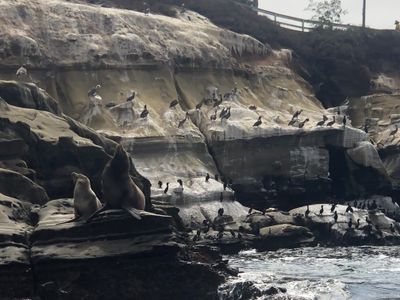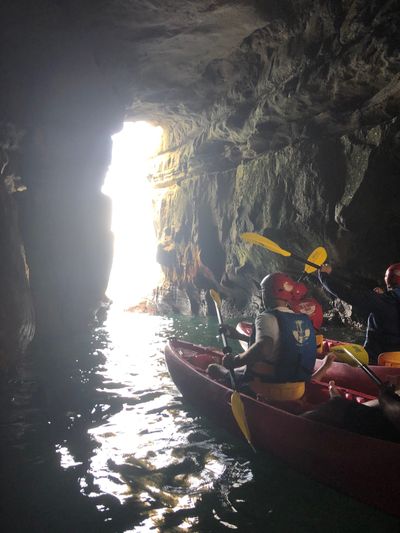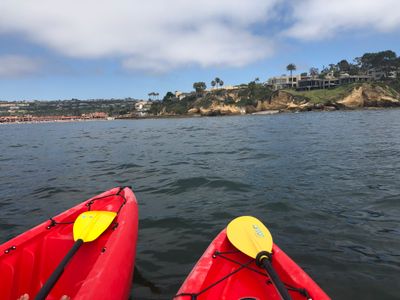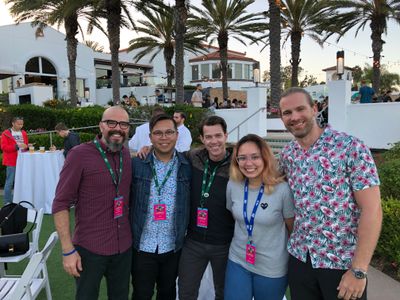A couple of weeks ago, five of us from Chromatic touched down in San Diego, California for our very first JSConf. We didn’t know what to expect, but we knew that we wanted to “kick the tires” and delve deep into the programming language of the web. Overall, the conference reminded us that the language can be pushed way beyond the boundaries of the web browser thanks to a collaborative open source community and robust ecosystem that allows for countless play and experimentation—from prototyping hardware using Node.js, all the way to running machine learning experiments and creating an AI musician.
In addition, our team discovered a warm and supportive community that placed an emphasis on inclusivity and in helping one another solve problems. We met enthusiastic JavaScript developers from all over the world and gained useful insight on their personal projects, as well as their day-to-day work, allowing us to take a pulse on the current front-end development landscape and the future of the industry as a whole.
JSConf ultimately delivered a rich experience full of inspiring speakers and fun group activities all along a beautiful SoCal backdrop.
The following are some of our favorite moments from #JSConfUS 2019:
Make It Boring
Jeremy Wagner’s Make It Boring offered a bold and refreshing take on the practice of front-end development today as it pertains to performance on the web. Much like his article with the same title, this presentation made a compelling argument for why we should put greater emphasis on using the right tools for the job, as opposed to those that are new and exciting, from a web performance and user experience perspective. Both the article and the talk (a video of which we hope will be released soon) are highly recommended.
¿Dónde Está La Bibliotecha?
Patricia Realini’s ¿Dónde Está La Bibliotecha?, about accessibility to the internet, was an eye-opening reminder that internet access is not as ubiquitous as one would expect in the United States. Broadband is still a luxury for many Americans, with many accessing the internet through their local libraries. Patricia poignantly highlighted the constraints that patrons experience when accessing the internet and how some policies like time limitations make it difficult for those who do not have internet access to apply for jobs or take certification tests. It was a sobering reminder that the way I experience the internet is vastly different than someone who lives in a rural area without the same access.
CSS Algorithms
One of the more memorable and eye-opening presentations we attended was called CSS Algorithms by Lara Schenk. In it, Schenk told an engaging story of what happened when she asked the question of whether or not “CSS is a programming language.” Her funny presentation—full of Schenk’s custom illustrations in the style of early-2000s flash movies—reminded us that CSS is indeed a “declarative, domain-specific programming language.” The presentation urged us to treat CSS with as much seriousness as other parts of the stack. We also learned that we can always do more to apply common software development practices to CSS, such as incorporating tests that check for styling regressions and creating reusable style rules.
Meet The Packets: How Audio Travels Into Your Browser
Although we hadn’t really tabbed this talk by Sara Fecadu as one we were dying to see, it ended up being incredibly interesting. There is so much going on when it comes to delivering audio over the web. Sara, in her first ever public tech talk, went deep on the ins and outs of just how all of those audio bits get transferred and reassembled into continuous audio experiences. Turns out, it’s way more complicated than we thought.
Kayaking in La Jolla
On the second day, attendees had the chance to participate in a “Choose Your Own Adventure” activity. Three of us opted for a kayaking adventure through sea caves in La Jolla. We found that paddling through the waves provided a great way to get in some exercise in between days of sitting through day-long sessions—with the added bonus of seeing the rugged San Diego coastline from a different point of view and dropping by to say “hello” to the local marine life.



Bringing Back Dial-up: the Internet Over SMS
Many on our team were blown away by the ingeniousness of Alexandra Sunderland’s Bringing Back Dial-up: the Internet Over SMS. Alexandra loves to travel and she was having a hard time with overseas data charges, so she built a solution based on SMS that involved a homegrown Android browser, and a Node.js server back home that leveraged Express and Twilio to serve as a proxy. She even came up with several compression algorithms to strip HTML content down to the bare essentials and reduce the payload size. The result is a stunningly clever solution to her problem. This presentation embodies one of our favorite things about our time at JSConfUS 2019; namely, that while there were a fair share of big-topic presentations, the conference makes tons of room for look at this cool thing that I made-style presentations.
Time Is a Social Construct
Nearing the end of the conference, Daniel Cousineau’s Time Is a Social Construct was an entertaining and very informative talk on just how complicated our understanding of time truly is, and why handling time in software is never as simple as one might think. Daniel’s presentation includes just the right amount of history, humor, and reality checks, all delivered at a pace that perfectly served the overwhelming complexity of the topic while keeping his audience engaged.
When it was time to head home, all 5 of us agreed that JSConfUS was an excellent, inspiring, and ultimately really well-run conference. We’d definitely recommend it if you’re on the fence for next year. You’ll likely come away with new experiences, perspectives, and ways of thinking about technology in our field.








